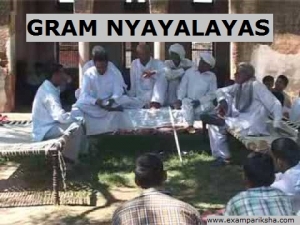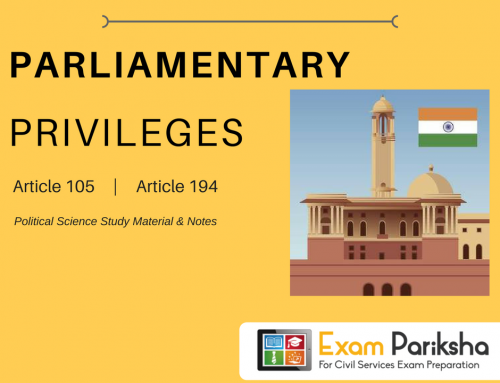The Gram Nyayalayas Act, 2008, mandates establishment of village courts to provide easy access to justice for people and reduce the case burden on the court system. This act requires the State Governments to establish Gram Nyayalayas with consultation of their respective High Courts.
Recently, the Union Law & Justice Minister has mentioned that state-wise progress for setting up of Gram Nyayalayas has not been encouraging and impressive.
Gram Nyayalayas
Gram Nyayalayas are also known as village courts which are established under the Gram Nyayalayas Act, 2008 meant for speedy and easy access to justice system in rural areas of India. The Gram Nyayalayas Act came into force from 2 October 2009.
Important Features of Gram Nyayalayas:
- Gram Nyayalaya are generally established at headquarters of every Panchayat at the intermediate level or a group of contiguous panchayats in a district where there is no panchayat located at intermediate level.
- The Gram Nyayalayas are presided over by ‘Nyayadhikari’, who has the same power, who enjoys same salary and the benefits of a first class – Judicial Magistrate. Such a Nyayadhikari is to be appointed by the State Government in consultation with their respective High Court.
- A Gram Nyayalaya has the jurisdiction over an area specified by a notification by the State Government in the consultation with their respective High Court. The High Court can then function as a mobile court at any place within the jurisdiction of such a Gram Nyayalaya.
- The Gram Nyayalayas have powers of both civil and criminal jurisdiction. The jurisdiction of the Gram Nyayalayas are fixed by their respective High Courts.
<<Read about Salient features of Indian Constitution here>>
- Both the Central and the State Government can add or remove items in their Schedule. While the Central Government can amend the list in the Schedule I and II by notifying them and, afterwards laying it in the Parliament, the State Government can then amend the items in Part III of Schedule I or II, in the law areas which the state is competent to enact the laws after due consultation with their respective High Court and hence notifying it. Such a notification has to be laid in State Legislature.
- The Gram Nyayalayas can follow a special procedures in civil matter, in a manner that it is deemed just and reasonable in the interest of justice.
- Gram Nyayalayas allow for conciliation of dispute and their settlement of the same in the first instance.
- Gram Nyayalayas have been given power to accept certain evidences which would otherwise not to be acceptable under Indian Evidence Act.
- The appeals in criminal matters can be made to the Sessions Court in their respective jurisdiction and in the civil matters the jurisdiction to the District Court within a period of one month from the judgement date.
Issues and problems related to Gram Nyayalayas:
The Gram Nyayalayas Act has not been implemented properly, as there have been only 194 functional Gram Nyayalayas in the country against a set target of 5000 courts.
A major reason behind these non-enforcement of includes financial constraints, reluctance of lawyers, police and different government officials.
With lukewarm response of the bar, non-availability of notaries and stamp vendors, along with problem of concurrent jurisdiction of regular courts are major issues indicated by the States. These issues are coming in the way of operations of the Gram Nayayalayas.
Steps taken by Government:
According to the Conference of Chief Justice of High Courts and Chief Ministers of the States, it was decided that the State Government and High Court should decide the issues related to establishment of Gram Nayayalas wherever feasible while taking into account their local problems. The focus of setting up of Gram Nayayalayas is in the Talukas where these courts have not been set up.





